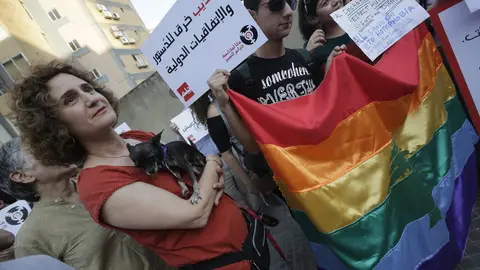Lebanese Pride Shut Down By Police, Organizer Arrested

Beirut Pride, which began on May 12 and was scheduled to continue through May 20, has come to an early and abrupt end after its organizer, Hadi Damien, was detained by Lebanese authorities.
According to a statement from Damien on the Beirut Pride website, on the night of Sunday, May 13, an Arabic reading of Ogres, a collection of narratives and short stories on homophobia, was scheduled to take place at Zoukak Theater Studios.
“However, and at 8:10 pm, I received a call from Zoukak Studio informing me that elements of the censorship bureau at the General Security were in the venue, refusing the reading to take place without prior censorship approval,” said Damien in the statement.
Last year, Lebanon became the first Arab country to celebrate gay pride. However, vows from some Islamic extremists to attack the parade resulted in a number of the week’s events being canceled. No parade had been scheduled for this year.
While many of the theatrical reading’s attendees left for fear of arrest or harassment, some stayed behind to discuss the possibility of relocating to a private residence. That conversation ended, however, when the police arrived and requested Damien to accompany them for questioning.
“We headed to the police station, without a warrant and handcuffs, only to be informed when we arrived around 11 pm that I would stay the night in the detention room,” the statement continued. “Phone calls were intense, some of them being from LGBT organizations and members who arrived to the station, without being able to enter the premises because of the late time. We were 39 people in a detention room of a five-person capacity.”
Although Lebanese law prohibits “unnatural sex”—a vague statute that has historically been used to criminalize gay and lesbian relationships—last year, a Lebanese judge—in a move hailed by LGBT activists—ruled that same-sex acts did not violate natural law. But this view has not permeated Lebanese society as a whole, and just two days later, Damien received a summons to return and face interrogators.
“It appeared that the main reason for my requisition is that the Public Prosecution received an Arabic version of the programme of Beirut Pride that was completely distorted, making the happenings of Beirut Pride appear like events of debauchery, disrespect of general law, while using derogatory terms to refer to LGBT individuals.”
Damien then received a call from the Public Prosecutor and was offered two choices:
“The first one is to cancel all the events of Beirut Pride that are scheduled until May 20, sign a pledge that assures the activities will not take place and to release me after I sign a residence document off. The second alternative is to cancel all the events of Beirut Pride that are scheduled until May 20, and not to sign the above-mentioned pledge, so I be referred to the investigation judge who will interrogate me on the basis of articles pertaining to the incitement to immorality and to the breach of public morality for coordinating the activities.”
"This was a warning... and the aim was to stop the events," his lawyer, Layal Saqr, told the Associated Press. “If he didn't sign the pledge, Damien could have faced misdemeanor charges or a criminal case punishable by up to two years in prison. I advised him to sign. We want him outside not behind bars.”





